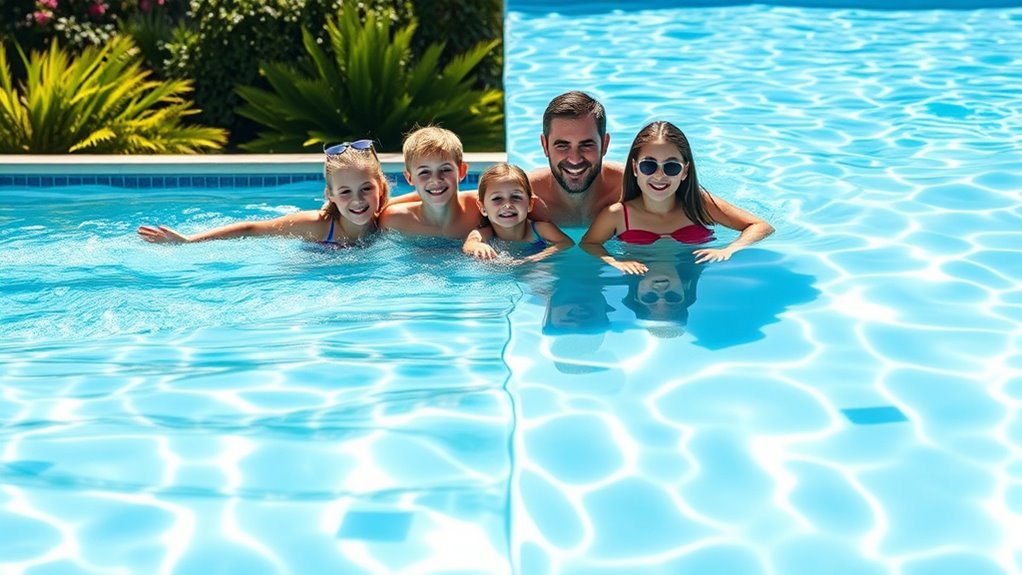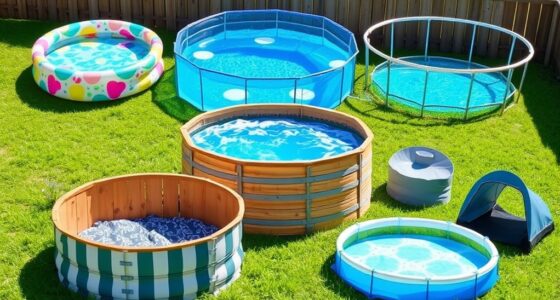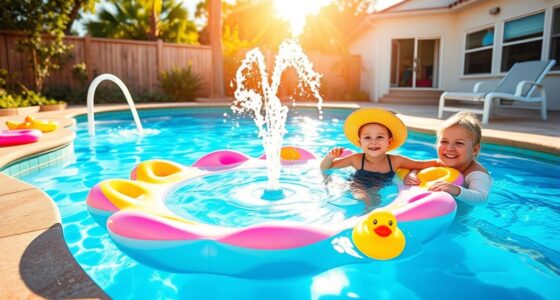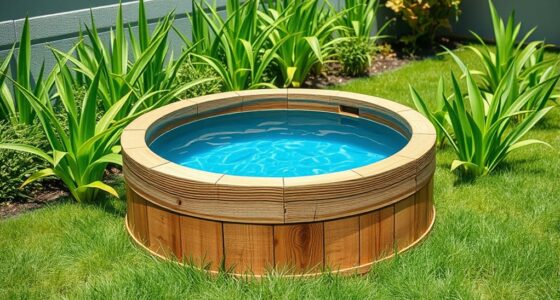Choosing between a saltwater and a chlorine pool depends on your family’s comfort and maintenance preferences. Saltwater pools are gentler on your skin, easier to manage over time, and cost less to operate, but they require careful monitoring of salt and chemical levels to prevent damage. Chlorine pools offer more control and initially cost less, though they need more frequent chemical adjustments and maintenance. Want to discover which option better suits your lifestyle? Keep exploring to find out more.
Key Takeaways
- Saltwater pools generally offer more comfortable, skin-friendly swimming experiences with less chemical smell and irritation.
- Chlorine pools provide more direct control over chemical levels but require more frequent maintenance and chemical adjustments.
- Saltwater pools have higher initial setup costs but lower ongoing chemical expenses compared to traditional chlorine pools.
- Proper chemical monitoring in both pool types is essential to prevent equipment damage, algae growth, and health issues.
- The best choice depends on your budget, maintenance willingness, and preference for comfort and chemical handling.
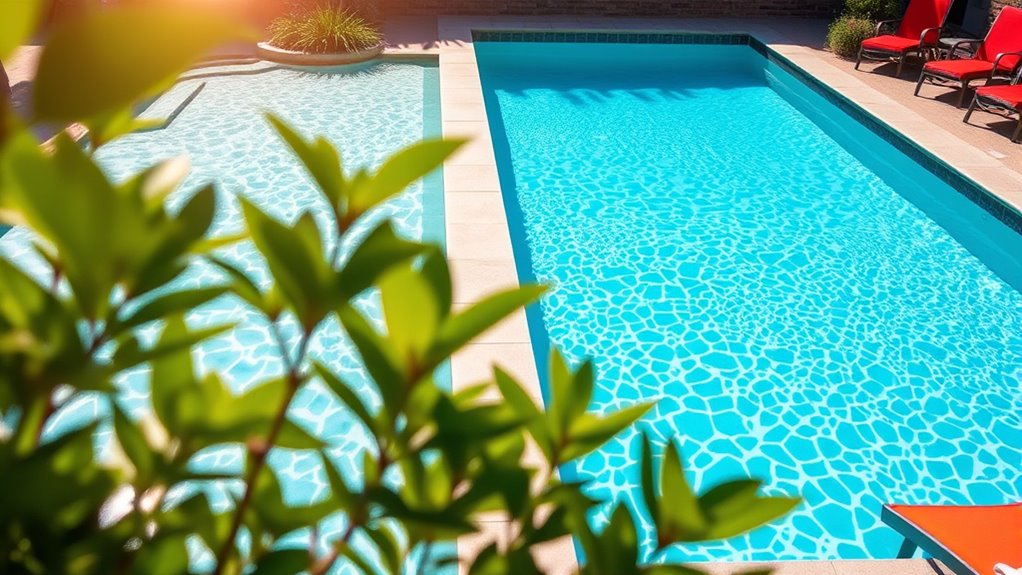
When choosing a pool type, many people compare saltwater and chlorine pools to find the best fit for their needs. Both options have their advantages, but understanding how they differ can help you make an informed decision. One significant factor to consider is pool maintenance. Saltwater pools tend to require less frequent chemical adjustments because the salt generator continuously produces chlorine, maintaining a steady chemical balance. This means you won’t need to handle chlorine tablets or manually add chemicals as often, which can save you time and effort. However, saltwater pools still need regular checks of the chemical balance to guarantee the water remains safe and clear. You’ll want to test the pH, alkalinity, and salt levels periodically and adjust as necessary to prevent issues like algae growth or corrosion of pool equipment. According to resources and tools, proper monitoring is essential to prevent equipment damage caused by improper chemical levels.
Saltwater pools need less chemical adjustment but still require regular testing for safe, clear water.
On the other hand, traditional chlorine pools often demand more hands-on maintenance. You typically add chlorine manually or through floating dispensers, which requires vigilance to keep the chemical balance stable. Proper pool maintenance involves balancing the chemical levels regularly—too much chlorine can cause skin irritation and damage your pool surfaces, while too little can lead to bacteria and algae growth. Maintaining the right chemical balance in either type of pool is essential for safe swimming and the longevity of your equipment. With chlorine pools, you might find yourself adjusting chemical levels more frequently, especially during hot or rainy weather when water conditions change rapidly.
Cost is another aspect to consider. Saltwater pools usually have higher upfront costs because of the salt generator installation, but they can be cheaper to operate over time since you use less chemical treatment. Chlorine pools might be less expensive initially, but ongoing purchasing of chlorine tablets or liquid chlorine adds up. Additionally, saltwater can be gentler on your skin and eyes, making it more comfortable for family members, especially those with sensitive skin. However, salt can corrode certain pool equipment if not properly maintained, so regular monitoring of chemical balance becomes even more critical to prevent damage.
Ultimately, your choice depends on your willingness to do regular maintenance and your budget. Saltwater pools offer a more consistent experience with less chemical handling, but they require careful monitoring of salt levels and chemical balance to avoid issues. Chlorine pools give you more control over chemical adjustments but demand more frequent attention. Weighing these factors will help you pick the pool type that fits your family’s needs, guaranteeing safe, enjoyable swimming while keeping maintenance manageable.
Frequently Asked Questions
Which Pool Type Has Lower Maintenance Costs Long-Term?
When comparing long-term costs, you’ll find that saltwater pools generally have a lower cost comparison over time. They require less maintenance frequency because the salt system continuously generates chlorine, reducing the need for chemical purchases. While initial setup might be higher, ongoing expenses tend to be lower with saltwater pools, making them more budget-friendly in the long run. You’ll spend less time and money maintaining your pool, saving you both effort and costs.
Are Saltwater Pools Safer for Children and Pets?
You might wonder if saltwater pools are safer for kids and pets. Generally, they offer better pool chemical safety because they produce fewer harsh chemicals, reducing irritation. Plus, modern water filtration systems keep water cleaner and clearer. However, always supervise children and pets around any pool, and regularly check water quality to make certain safety. Proper maintenance and understanding of your pool’s chemical levels are key to keeping everyone safe.
How Do Saltwater Pools Impact Skin and Eye Irritation?
Imagine your skin and eyes as delicate flowers in a garden. Saltwater pools tend to be gentler, reducing skin dryness and eye discomfort compared to traditional chlorinated pools. The salt acts like a soothing rain, calming irritation and making your swim more comfortable. While some still experience minor dryness or irritation, most find saltwater pools kinder to their skin and eyes, creating a more enjoyable, irritation-free swimming experience.
Can I Convert My Existing Chlorine Pool to Saltwater?
You can definitely convert your existing chlorine pool to a saltwater system through a pool conversion process. It involves an equipment upgrade, mainly installing a salt chlorine generator. This device produces chlorine from salt, making maintenance easier and potentially reducing skin and eye irritation. Just make certain your pool’s surface and plumbing are compatible, and follow the manufacturer’s instructions for a smooth transition.
What Are the Environmental Impacts of Each Pool Type?
Imagine the environment’s fate hanging in the balance—your pool choices matter more than you think. Chlorine pools often use chemicals that can runoff, impacting nearby ecosystems. Saltwater pools, on the other hand, tend to promote eco-friendly practices with fewer harsh chemicals. By choosing wisely, you reduce chemical runoff and protect water quality, helping create a safer environment for your family and community. The choice isn’t just about your pool—it’s about the planet.
Conclusion
Ultimately, choosing between a saltwater or chlorine pool depends on what matters most to your family—comfort, maintenance, or budget. Remember, even in this modern age, a pool is a haven where memories are made, like those lazy summer days of yore. Whichever you select, make certain it’s a place where your loved ones can splash, relax, and create stories to cherish for generations. After all, a pool is more than water — it’s a sanctuary.

